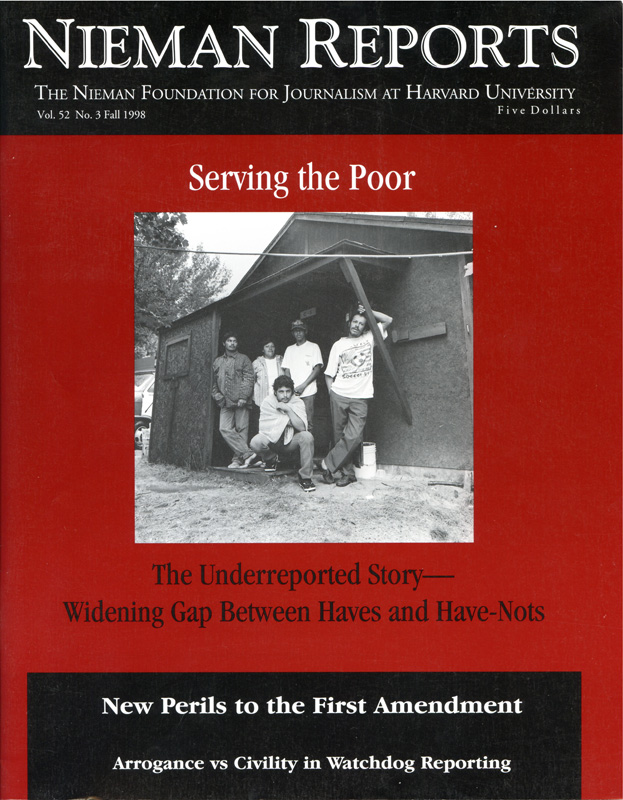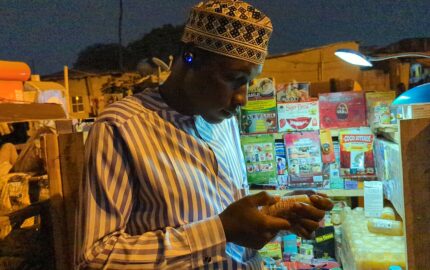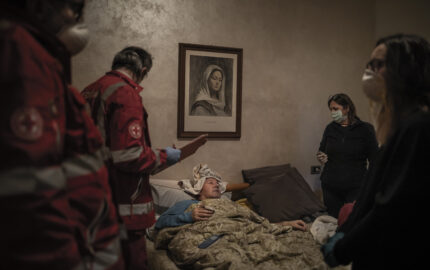
The controlling word for journalists remains “responsibility,” which means to protect what government ministers or officials think best for the nation or their careers. In the Suharto days editors and reporters were called into military headquarters and warned if they were considered “irresponsible.” Today, only the style has changed. The military and President B. J. Habibie’s people are more civil. They use social gatherings to give the same message—be more “responsible”—to journalists. With the international media in Jakarta, Habibie’s men would not dare risk the old-style confrontation.
But the message is the same and editors remember the old days and know that the international media will drift away from Indonesia. Fear counsels them to avoid upsetting the military or ruling party. The result, so far, has been self-censorship.
For example, not long ago I submitted to my newspaper, Kompas, five articles, based on interviews with nine world experts, on important issues facing Indonesia. They dealt with (1) rewriting the country’s constitution, which is overbalanced in executive power at the expense of the legislature and judiciary, (2) whether the economy Indonesian Media Still Censoring Itself or political reform should have priority, (3) options for the military, (4) what to do about the economy, and (5) whether Indonesia would become an Islamic state.
None of these articles has been published. My editors are nervous because some of the topics, like the constitution, are still taboo. I also abandoned the indirect writing style of invoking allegories and figures of speech that we used when Suharto was in power. The pieces were too blunt for my editors. Hopefully the editors will use the articles as the basis for assignments.
It is difficult for journalists to shake off the fear that for decades has dictated the way journalists look at contentious issues like human rights, corruption and dictatorship. Journalists would write about these issues hardly mentioning the words human rights, corruption or dictatorship. The art was to raise the issues without alarming the authorities. I developed a debit and credit list in my mind, for example, on East Timor. The credits would be the points in the story that supported the government, for example economic development and rising education standards. The debits would be points criticizing the government, for example the military presence and human rights abuses. I would at the end always try and balance the credit and debit points. (Perhaps, if I was in a mischievous or confident mood, with one point more on the debit side!)
The official reason given for not publishing my five articles is that there is not enough space, but those who have read the articles know it is more than that. It is only fair to note, however, that because of rising prices of newsprint, Kompas has cut its pages from 40 to 12 and is getting ready to go down to eight.
Despite its timidity, the Indonesian media have shown some life, but the anger has been conveniently directed at Suharto and his family. Even these revelations are only surface deep. Absolutely nothing has been written about the wealth of Habibie and his two sons. Last year a doctoral thesis at Australian National University, Canberra, examined high tech industries on the island of Batam near Singapore. It reported that he owned everything. Indonesians have been under the impression that Batam belongs to the Indonesian government.
Also the press has reported nothing on holdings of the military, which has a stranglehold on the oil industry. Their families have lived wealthy lives.
It will be interesting to see whether these issues will ever be raised. After all, most of the élite are the creation of Suharto and exposing them could mean exposing all.
So where does the public get the truth? Unfortunately, the Internet, the hope of so many, has not been reliable. It has been used for political purposes and for propaganda by almost every group. I have chased stories on the Internet only to find them false.
The problem was never that Indonesian journalists wanted to run amok and create a civil war. But the distorted meaning of “responsible” has in turn distorted journalism. During the last 20 years many young journalists have come to think that responsibility does not go hand in hand with freedom of the press. They have been so stifled by “responsibility” that they now have to be persuaded that it is part of freedom.
The former Minister of Information, Harmoko, who is now the speaker of parliament and headed the call for Suharto’s resignation, lectured us for more than 10 years on not inciting the “SARA” (Suku, Agama dan Ras, meaning clan, religion and race) issue in our coverage. Most Indonesian journalists have never wanted to incite “SARA” hatred.
But problems arose when we wanted to cover other issues, for example, the projects the President’s children kept winning. We were accused of being irresponsible for trying to investigate the tendering process. How did the oldest daughter of the President manage to win all the tenders for the toll road in Jakarta?
Being “responsible” became the starting point of a process of self-censorship for Indonesian journalists. How much of the truth can I really tell? If it was a story about another country but reflected the situation in Indonesia, it was safe to assume that one could get away with 80 percent of the story. If it concerned Indonesia directly then maybe only 10 percent or 20 percent of the truth could be written. The Suharto family was a no go area. I remember being in Perth when Tommy Suharto was in town. Another Indonesian journalist said to me “oh well, impossible to write, let’s have a bowl of noodles.” Western journalists drown their sorrows at the bar. Asian journalists seek comfort in a bowl of noodles.
The second stage of this process of self-censorship occurred when the editors got their hands on the story. By the time the story got published, everyone’s fear of what the authorities might think of it had gutted it.
The source of this fear and of self-censorship was the power the authorities had to close you down. In Indonesia the print media operated under license, which could be removed without any legal process or right of appeal.
It takes enormous courage to try to print information you know the authorities will not like. Not only your own job, but everyone else’s, is at stake. Fear of being closed by revoking our licenses (which was only for print media, not radio or television) was real. In 1994 the news weekly magazine Tempo was closed after 23 years of publishing. This was a turning point for Indonesian journalism and also for Indonesian politics. It was a humiliating experience for Indonesian journalism. Tempo had set a high standard of journalism while also trying to be responsible, trying to meet the authorities half way. But it wasn’t enough. They still closed Tempo down because it dared to expose a difference of opinion in ex- President Suharto’s cabinet, about a project of his protégé Habibie.
Now that the licensing is over, how long will self-censorship remain?
I believe that the Indonesian media will have to go through a period of soul-searching before finding itself. Journalists must confront fears they have been living with, which have seeped into every corner of the media, paralyzing it.
It was fear that split journalists into two camps after the Tempo closure. One group wanted to live quietly and keep their jobs in order to manage their family obligations. The other wanted to start a revolution and saw no more room for compromise. This group felt betrayed that the first group did not join them.
How should the Indonesian media manage the coming transition? First and foremost, it has to be depoliticized, because for more than 20 years the government has been able to silence the media. The media has become dependent on government or sections of the government for its treatment of stories, its way of thinking about issues, its support of various political leaders. So, first the media has to learn how to think for themselves. Then, bureaucrats and government officials must get used to articles that are critical and not respond by trying to silence the media.
The licensing system has been dismantled, but in practice the media is still being very careful because the political situation in Indonesia is still fluid. The economic crisis is a double-edged sword. It can and has galvanized change, forcing Suharto to resign as president. But it can also be an impediment to democratizing Indonesia. The economic crisis will mean many people living below the poverty line, and poverty can make people yield to pressures for strong government and political leadership. Of course we all want a democracy, it will be said, but not too quickly. Perhaps the old guard will return, presenting themselves differently. The licensing system may not return, but under pressure, editors can always be removed, as is happening in Malaysia.
Most of all Indonesian journalists must debrief themselves from the fear that has strangled them for the last two decades. We must begin to think straight and to the point rather than ambiguously, as a way out. It will be a very private and individual process for every journalist. For some it will be a great release, but for others it will be a very painful process to start thinking differently.
I do not advocate Western-style media freedom for Indonesia. Nor do I think that democracy and quality journalism are only for rich and settled countries. They are human rights.
The Indonesian media will have an important role in strengthening civil society, especially because most Indonesians are not highly educated. We must write simply and succinctly about complex issues. Most of all we must be able to write as truthfully as possible.
 Ratih Hardjono is a foreign correspondent for Kompas, Indonesia’s most influential daily newspaper printed in Bahasa Indonesia, the national language. She also writes occasional articles and columns for The Jakarta Post and English-language daily newspapers. She is a 1994 Nieman Fellow. Hardjono has written a book on Australia, “White Tribe of Asia” (1993). She wrote it first for an Indonesian publisher. Later it was published in English in Australia. After graduating from Sydney University, she became a teacher. Based in Melbourne, Hardjono writes about many countries and international issues. During the Persian Gulf War she reported from Washington.
Ratih Hardjono is a foreign correspondent for Kompas, Indonesia’s most influential daily newspaper printed in Bahasa Indonesia, the national language. She also writes occasional articles and columns for The Jakarta Post and English-language daily newspapers. She is a 1994 Nieman Fellow. Hardjono has written a book on Australia, “White Tribe of Asia” (1993). She wrote it first for an Indonesian publisher. Later it was published in English in Australia. After graduating from Sydney University, she became a teacher. Based in Melbourne, Hardjono writes about many countries and international issues. During the Persian Gulf War she reported from Washington.


